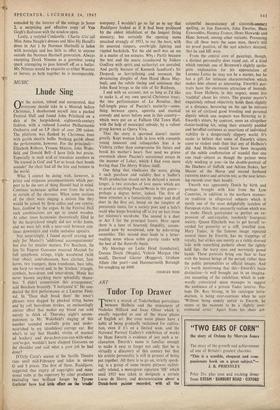MUSIC
Lhude Sing
ON the notion, inbred and unrepented, that everyone should take in a Messiah before Christmas, I shoehorned myself into a packed Festival Hall and found John Pritchard on a dais at the harpsichord, eighteenth-century fashion, with a reduced London Philharmonic Orchestra and an LP choir of over 200 voices. The platform was flanked by Christmas trees with garish electric bulbs. Nothing garish about the performance, however. For the principals— Elizabeth Robson, Yvonne Minton, John Wake- field and Donald Bell—I have little but praise. Especially in such acid or' truculent numbers as `He trusted in God' and `Let us break their bonds asunder' the choir had all the bite and bounce in the world.
What I cannot be doing with, however, is prissy and exiguous accompaniments which pur- port to be the sort of thing Handel had in mind. Continuo technique spilled over from the arias to certain of the choruses. When some sections of the choir were singing a unison line they would be joined by three cellos and one contra- bass, doubled by the organ. In the Festival Hall such combinations are apt to sound wooden. At other times harmonies theoretically filled in by the harpsichord simply did not strike home, and we were left with a near-void between con- tinuo downstairs and violin melodies upstairs.
Not surprisingly, I found myself craving not only for Mozart's 'additional accompaniments' but also for meatier matters. For Beecham, the late Sir Eugene Goossens rescored Messiah for full symphonic strings, triple woodwind (with four oboe), contrabassoon, bass clarinet, four horns, two trumpets, three trombones, bass tuba, one harp (or more) and, in the `kitchen,' triangle, cymbals, bass-drum and tenor-drum. Music has never known anything more splendidly shame- less. `I didn't commission this arrangement,' said Beecham brazenly. `I instigated it.' He con- ducted the first performance at a Lucerne Festi- val. In `Thou shalt break them' the tenor's phrases were dogged by plucked string basses and by soft bass-drum strokes, an enchantingly sinister effect that makes my blood run cold merely to think of. Thursday night's accom- paniment to Mr. Wakefield's singing of this number sounded woefully prim and under- nourished to my (doubtless), corrupt ear. But who's to say that Handel, victim of musical ad hockery and dcr-as-best-you-can-with-what- you've-got, wouldn't have clapped Goossens on the shoulder and said what a goot job he had done?
D'Oyly Carte's season at the Saville Theatre runs until mid-February and takes in eleven G and S pieces. The first of these, Ruddigore, suggested that expiry of copyrights and occa- sional stabs at the repertory by other producers (including two brilliant forays by 'Tyrone Guthrie) have had little effect as the 'cradle' company. I wouldn't go so far as to say that Ruddigore looked as if it had been produced
by the oldest inhabitant or the longest living memory; but certainly the opening scene smacked strongly of 1913, to say the least, with its assorted simpers, overbright lighting and
rippled backcloth. Yet the old spell was on me in a matter of ten minutes. Why I Partly because
the text and the music (conducted by Isidore Godfrey with spirit and authority) are unstaled. And partly because of Kenneth Sandford's Sir Despard, so horripilating . and resonant, the devastating dimples of Ann Hood (Rose May- bud), and the subtle timing and sentiment that John Reed brings to the role of Sir Ruthven.
I end with an account, not as long as I'd like to make it, of my own special Christmas treat: the two performances of La Rondine. that full-length piece of Puccini's maturity—some- thing between opera, operetta and musical comedy and never before seen in this country— which were put on at Fulham Old Town Hall, with the help of municipal subsidy, by a valiant group known as Opera Viva.
That the story is spavined doesn't matter greatly. Kept woman falls in love with romantic young innocent and relinquishes him a la Violetta rather than compromise his future and break his mother's heart. Nor need we grieve overmuch about Puccini's occasional essays in the manner of Lehar, which I find even more boring than The Merry Widow itself.
One thing that vindicates the • score, giving it such purchase and validity, that a Sadler's Wells production should not be delayed a season longer, is two stretches of love music which are as good as anything Puccini My blessings on Leslie Head (conductor), Doreen Doyle (Magda), Valerie Morgan (the maid), Dermal Gloster (Ruggero), Graham Allum (the poet)—and Hammersmith Borough for coughing up £600. CHARLES REID






























 Previous page
Previous page